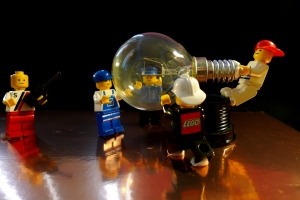 Peer revision is a gamble. At its best, students offer rich feedback and revision becomes an incredibly rich learning experience for all involved. At its worse, peer responses can be a bit like turning over the cockpit controls to a thirteen year old who is still years away from having even a driver’s permit.
Peer revision is a gamble. At its best, students offer rich feedback and revision becomes an incredibly rich learning experience for all involved. At its worse, peer responses can be a bit like turning over the cockpit controls to a thirteen year old who is still years away from having even a driver’s permit.
I am always, then, looking for ways to make peer revision more meaningful. Here are a few ideas that have worked for me:
Three Chip Revision: Break out some poker chips. To begin, give every student three chips (or any number of chips you decide). Then, hand them a piece of writing from one of their peers and ask them to spot the mistakes. Each error they find, however, has to be checked by the teacher. If they have found a legitimate error, they get two more chips. If they are mistaken and no error exists, take a chip. The goal is to end the revision period with the most chips.
To keep myself sane, I add a few more rules. This exercise is a completely silent one. If they speak to anyone other than me, they lose a chip. Also, I have them line up and continue to edit while in line. This way I move from one student to the next very, very quickly.
For some reason, giving students the chips to hold makes the exercise work. I did this just last week with my grade 6 students, and they liked it so much they asked to play the game again the next day.
Also, I sometimes give the error “hunt” a focus. For instance, last week I awarded “double point chips” for finding run-on sentences, a concept that we are studying in class.
NOTE:This idea is not my own, but I cannot remember where I first read about it. If anyone knows the original source, please share it. I would love to give credit where credit is due.
Jane Schaffer Peer Response: I have been a devotee of Jane Schaffer for many years. Her methods work. By the way, anyone who complains that her methodology is too rigid has probably not been through her training. It might seem lock step to the outsider, but her process emphasizes breaking the molds once students have a solid organizational foundation. Also, if you read what she has to say about peer response, you will see that many of her suggestions promote critical, open-ended thinking. Put another way, she promotes convergent thinking to lead students toward divergent thinking.
 Dig Deeper: My research for this blog prompt led me to these suggestions for peer response exercises from the Stanford Center for Teaching and Learning. The points made here are inspirational and helpful. I will utilize many of them during my next peer revision exercise.
Dig Deeper: My research for this blog prompt led me to these suggestions for peer response exercises from the Stanford Center for Teaching and Learning. The points made here are inspirational and helpful. I will utilize many of them during my next peer revision exercise.
As teachers of writing, we know that students must write more often to improve. We also know that our ability to offer timely feedback is limited. (I’m being tactful here. I could also write that I do not want to give another bleeping moment of my personal life to essay grading.)
I have written a previous post about some of the ways I try to tackle this time dilemma, and I have used automated feedback systems like Writer’s Workbench in the past. (Currently, I am testing Criterion and White Smoke as well. I will share my reviews later).
Of course, creating effective peer revision in the classroom is also critical to students’ growth. Writing instructors are good writers because we spend so much of our time fixing language. Students need to do more of this work; we need to do less. I know I could be better at this aspect of my teaching, and writing this post has reminded me of the importance of shifting the responsibility for effective feedback to my students.
I invite you to leave your suggestions for effective peer revision as well. Please! Really. I’m doing a bit of groveling here. Leave a comment. Others will benefit. More importantly, I will benefit.
